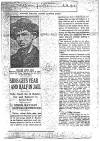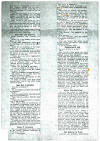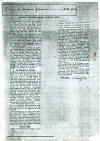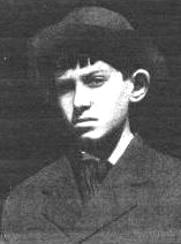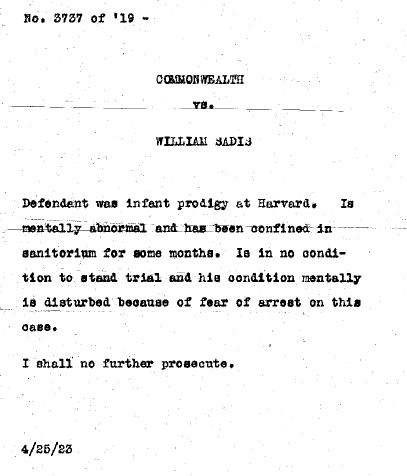| Archives
Home .pdf
Distortion of his likeness aside, this article contains some of his trial testimony.
William James Sidis, who was graduated from Harvard at the age of 15, told Judge Albert F. Hayden in the Roxbury Municipal Court yesterday that he is a Socialist, a believer in the soviet form of government, that he believed in evolution, that he does not believe in a god, that his god is evolution, and that he believes in our form of government to the extent of the Declaration of Independence. Sidis and 11 other persons who were arrested during the May Day riots in Roxbury were given jail sentences, the so-called Harvard prodigy getting a year and a half. The testimony of Sidis in the afternoon and the rebuke of Atty. Edward M. Shanley by Judge Hayden in the morning, when the attorney attempted to introduce evidence which the court excluded, were features of the trial yesterday. Patrolman Samuel C. Hutchins of the Dudley street station had, in his direct examination, identified 7 of the 11 defendants who went on trial yesterday morning, including Edmund Savrie, 74 Cedar street, Roxbury; Peter Thompson, 15 Temple street, West end; Alex Glasnick, Sidis, Frank Szydlofski of 90 Hunneman street, Roxbury, and Samuel Shoyet of 1077A Blue Hill avenue, Roxbury. While Hutchins was testifying Patrolman William E. Wiseman, who had preceded him on the witness stand, made some notes having no connection with the hearing, so when Hutchins concluded his testimony Attorney Shanley recalled Wiseman to the witness stand and asked him to tell what notes he had made. Judge Hayden, arising from his chair, excluded the question and told Wiseman not to answer and to step down from the witness box. As Wiseman walked to his seat Shanley asked him for the paper and received it. Here Judge Hayden told Attorney Shanley that he would be removed from the cases if he attempted to introduce evidence which the court had ruled out. Shanley replied that he appeared for defendants, stating that he was there to assert their rights and see that they were protected, but the court refused to allow him to proceed and told Atty. Thomas G. Connolly, appearing for other defendants, to take up the defence of those represented by Shanley.
Bars Attorney Shanley remained within the bar enclosure, but took no part in proceedings until Special Officer Stephen E. Gillis of the Dudley street station identified Andrew Ford of 23 Oakwood street as a parader. Shanley then started to cross-examine Gillis, when Judge Hayden told him that he had been barred from further appearance in the cases. Atty. Shanley replied that he represented certain people, when the court again interjected, "I refuse to let you proceed." Atty. Shanley remarked that it was an autocratic rule, adding that he was present to protect his clients' rights and concluded by saying that the ruling "helps the cause along." "Sidis, called to the stand, was quick in his response to questions propounded and seemed, while nervous at times, to be little concerned with the serious charges on which he was in court.He said that his name was William James Sidis, and that he lived at 200 Newbury street, Back Bay.
Questions and Answers These questions and answers followed: "Were you at the Dudley Street Opera House on May 1?" "I was there continuously from 11 in the morning until 2 o'clock in the afternoon." "What did the chairman at the Opera House say to those assembled? "He said that there was to be a meeting at New International Hall and that we should all go; so I went with the crowd to the new hall." "Where were you when the paraders left the hall?" "At the beginning I was in the rear of the line, and at different parts of the line at different times. When we reached Walnut Avenue and Warren Street, I was in the rear." "Were you carrying a red flag? "I was carrying a red flag, 3 by 3 feet; it was a piece of red silk tacked to a piece of stick." "Did you remember witness Sullivan?" "He yelled to me to take down the flag and I made no reply." "Was there any disturbance on the part of the paraders?" "I heard no noise until later some persons started to sing."
Says He's a Socialist "Are you a Socialist?" "Yes." "Do you believe in the soviet form of government?" "I do." "Will you state briefly what the soviet form of government is?" "That will be a rather difficult thing to do." "Could you give His Honor a description in 100 words?" "The soviet form of government is the present revolutionary form in Russia. The soviet word is the Russian word for counsel. The general principle is that those who do socially useful work are to control the government and industries of the country as officials in government do in general. The fundamental principle is that everybody is supposed to work." "Would you say in that respect only those who do socially useful work?" "I would state that those who do work shall be entitled to control the government, but those who are in non-essential industries should not be counted."
Force if Necessary "Do you understand that they intend to get control through industries in which they work?" "So I understand." "By force if necessary?" "I understand every government implies a certain power to suppress opposition." "That does not answer the question. You said before that the people want control of the industries of the country. I want to know whether you advocate by force the control of the industries of the country or by the use of the ballot?" "I countenance the use of force only in case it should be necessary, and I base my statement on a comparison with the Declaration of Independence of the United States government, which states clearly that the people shall be governed only with the consent of the government [governed]." "Who decides? The majority or the minority? "The majority." "Do you believe in economic evolution?" "I do." "Can any person tell what course human events will take or what forms of government?" "I say practically that." Disbelieves in God "Do you believe in a god?" "No." Atty. Connolly then asked the court what God he meant, whereupon Judge Hayden replied, God Almighty. Here Sidis said that the kind of a God that he did not believe in was the "big boss of the Christians," adding that he believed in something that is in a way apart from a human being."Asked by his attorney if the soviet ideals necessarily implied violence, he replied in the negative, stating that there should not be any violence on the road to that goal. Describing Bolsheviki and political Socialists, Sidis said that the latter believed mainly in the ballot, the former in control of industry. Asked if, on the day of the alleged riots, there were any circumstances attending the marching people that would have been indicative of trouble if the paraders had been left alone, Sidis said, "nothing whatever." If the people had not been interfered with by the hoodlums, he declared, there would not have been any trouble at all.Shows Him Red Flag The red flag which he had carried was shown to him by his attorney and he said that the red stood for the common blood of humanity as it does in the American flag. Asked what the red in the American flag represented, the defendant said that it stands for the common brotherhood of mankind. He said that he did not believe that we should have idolatry in the world. He added that he did not idolize the red flag, adding that it was just a piece of red silk. Cross-examined by Sergt. Dennis J. Casey, appearing for the government, Sidis said he was born in New York city, and that he is 21 years old. He said he was in the draft and claimed exemption because of conscientious objections. Sergt. Casey asked him what feeling he would have if the American flag were trampled upon and Sidis did not answer. He said he saw paraders struck without provocation. Asked if he did not urge the people to go ahead when the police arrived, the defendant said that he told them to stop.
Not Believer in Force Connolly, on re-direct examination, told Sidis that, for a man who believed in the soviet form of government, he certainly did not use much force. And Sidis remarked that he did not believe in using force. He denied that he had said, "To hell with the American flag," as the police testified he had, adding that he never used such language. Judge Hayden then asked him why he did not carry an American flag instead of the red flag, and he said he had one in his pocket but that it was not an organized parade. The court asked him if he did not carry it for protection, and the defendant said he had attended several meetings and that it might be wanted. "Do you believe in what the American flag stands for," queried Judge Hayden. The defendant answered that he believed in certain ways for what it stands, in the sense of the Declaration of Independence. Asked if Martha H. Foley, the militant suffragist, already sentenced to 18 months, and himself were not the organizers of the parade and had charge, he replied in the negative. He denied that he was a leader, stating that there were no leaders in the parade, and that as far as he knew, no permit was asked for a parade.
No Thought of Trouble Asked if he did not think there would be trouble when he went on the street with a red flag, Sidis said that it did not occur to him. He said that under the American flag he did not stand for lynching of Negroes without trial. Attorney Connolly propounded a question on alleged crowding of mining strikers to hunger in Arizona, asking him if he would stand for that under our flag, he replied in the negative, whereupon Judge Hayden stated that we all know what the American flag stands for Atty. Connolly declared that he didn't, adding that we had slavery here, fighting of armed thugs, and everything else. Other defendants who took the stand included Benjamin Barden of Chelsea, treasurer of the Millinery Workers' Union. He admitted he was a Socialist. He was not a parader, he said. Peter Thompson testified that he had been at a dentist's office, heard of trouble and that when he came out of the building, hands in his pockets, he was arrested. Edmund Savrie of 74 Cedar street, Roxbury, was identified by Patrolmen Morse and Hutchins; Peter Thompson was identified as a parader by Patrolman Hutchins, while Patrolman Moore identified Gedart Gehre. Alex Glasnick was identified by Sergt. Casey, and Patrolmen Hutchins, Moore, Cummings, and Patrolman Gillis and Sergt. Casey identified Andrew Ford as a parader.
Identify Sidis Sidis was identified by Sergt. Casey, Patrolmen Wiseman, Hutchins and Cummings. Deomid Pitnichny of 96 Auburn street, Chelsea, was identified by Sergt. Casey and Patrolmen Hutchins and McAllister, and Patrolman Murphy picked out Benjamin Barden as one of the marchers. Patrolman McAllister identified Joe Waranski, and Frank Szydlofski was identified by Solomon, Hutchins, Moore and Cashman, while Solomon, Hutchins, Gillis and McAllister identified Samuel Shoyet as a parader. After the defence had completed its testimony, Judge Hayden sentenced Edmund Savrie, Peter Thompson, Joe Markovitz, Alex Glasnick, Andrew Ford, Deomid Pitnichny, Benjamin Barden, Joe Waranski and Samuel Shoyet to the house of correction for three months on a charge of rioting and an additional three months for an assault on Hutchins. Sidis, Berhe and Szydlofski were given six months for rioting and one year additional for assault. All appealed, Sidis being held in bonds of $5000 for the superior court and the other defendants in $1000 each. John Borasnick of 99 Blossom street, Lynn, and Roman Berasofsky and Samuel Andrefsky of 208 Washington street, Walpole, were discharged. Several cases of alleged rioting were put over until May 22, but all other cases have been disposed by Judge Hayden, who sat continuously on the cases since May 1.
|
